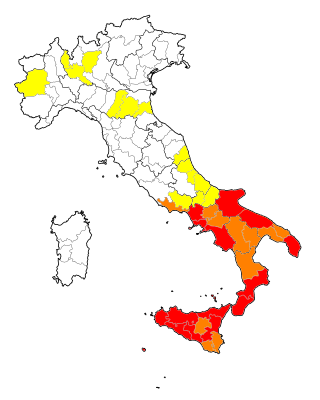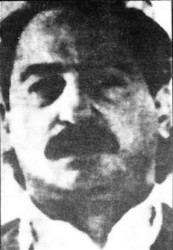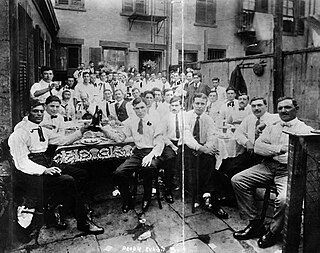Origins
The origins of the term come from the Sicilian Mafia. In the Sicilian language, the word cosca , which is the crown of spiny, closely folded leaves on plants such as the artichoke or the thistle, symbolizes the tightness of relationships between members. The word cosca is also used for clan . In the early days of the Mafia, loose groups of bandits organized themselves into associations that over time became more organized, and they adopted the term based on both of its meanings.
As the Mafia was imported into the United States in the late 19th century, the English translation of the word cosca was more at clan or family.
The term can be a point of confusion, especially in popular culture and Hollywood, because in the truest sense, crime families are not necessarily blood families who happen to be involved in criminal activity, and they are not necessarily based on blood relationships. In Sicily and America, most Mafia bosses are not related to their predecessors. [1] [2] Films like The Godfather and a spate of late-1980s "Mafia princess" television movies underscore this confusion.
It can further be speculated that the Mafia was simply emulating, to a certain degree, a more medieval order in which a noble family would more or less serve as the power in a local village, in a sort of inverted hacienda culture.
The Calabrian 'Ndrangheta is, however, purported to be organized along familial lines as 'ndrine .
Nevertheless, the term stuck, both in the minds of popular culture as well as the national law enforcement community, and eventually began to be used to describe individual units of not only Sicilian gangsters, but those whose origins lie in other parts of Italy (e.g., the aforementioned 'Ndrangheta, the Neapolitan Camorra , the Apulian Sacra Corona Unita , etc.). Indeed, the "family" mystique persists to such a great degree that in the late 1990s, after many Camorra leaders were imprisoned during a large-scale crackdown in Naples, many of their wives, girlfriends, daughters, and even mothers took temporary control of their gangs, in a widespread phenomenon of Camorra "godmothers".
Sometimes the term is used to describe distinct units of crime syndicates of other ethnic and national origin, such as the Irish Mob, Japanese Yakuza , Chinese Tongs and Triads , Indian mafia , Colombian and Mexican drug cartels , Albanian mafia, Russian mafia. Although not necessarily the norm, some of these entities, like the 'Ndrangheta, may also be organized along blood-family lines.
The 'Ndrangheta is an Italian Mafia-type association based in the peninsular region of Calabria and dating back to the 19th century. Although loosely structured, it is considered one of the most powerful organized crime groups in the world. It is characterized by a horizontal structure made up of autonomous clans known as 'ndrine, based almost exclusively on blood ties. Since the 1950s, following wide-scale emigration from Calabria, 'Ndrangheta clans dispersed to other European countries, Australia and the Americas. Currently, its main activity is drug trafficking, but it also deals with arms trafficking, money laundering, racketeering, extortion, and loan sharking.
The Camorra is an Italian Mafia-type criminal organization and criminal society originating in the region of Campania. It is one of the oldest and largest criminal organizations in Italy, dating to the 17th century. The Camorra's organizational structure is divided into individual groups called "clans". Every capo or "boss" is the head of a clan, in which there may be tens or hundreds of affiliates, depending on the clan's power and structure. The Camorra's main businesses are drug trafficking, racketeering, counterfeiting, and money laundering. It is also not unusual for Camorra clans to infiltrate the politics of their respective areas.
Sacra Corona Unita, also known as the Fourth Mafia, is a Mafia-type criminal organization from the Apulia region in Southern Italy, and it is especially active in the areas of Brindisi, Lecce, and Taranto.
A drug cartel is a criminal organization composed of independent drug lords who collude with each other in order to improve their profits and dominate the illegal drug trade. Drug cartels form with the purpose of controlling the supply of the illegal drug trade and maintaining prices at a high level. The formations of drug cartels are common in Latin American countries. Rivalries between multiple drug cartels cause them to wage turf wars against each other.
"Mafia" is an informal term that is used to describe criminal organizations that bear a strong similarity to the organized crime groups from Italy. The central activity of such an organization would be the arbitration of disputes between criminals as well as the organization and enforcement of illicit agreements between criminals through the use of or threat of violence. Mafias often engage in secondary activities such as gambling, loan sharking, drug-trafficking, prostitution, and fraud.
The Sicilian Mafia or Cosa Nostra, also referred to as simply Mafia, is a criminal society originating on the island of Sicily and dates back to the mid-19th century. It is an association of gangs which sell their protection and arbitration services under a common brand. The Mafia's core activities are protection racketeering, the arbitration of disputes between criminals, and the organizing and oversight of illegal agreements and transactions.

The Nuova Mala del Brenta (NMB), also known as New Brenta Mafia, is a criminal organization based in the Veneto region of Italy. The group is believed to have emerged in the late 1990s as a successor to the original Mala del Brenta, which was active in the area during the 1970s and 1980s.

Criminal organizations have been prevalent in Italy, especially in the southern part of the country, for centuries and have affected the social and economic life of many Italian regions. There are major native mafia-like organizations that are heavily active in Italy. The most powerful of these organizations, the 'Ndrangheta from Calabria, the Cosa Nostra from Sicily, and the Camorra based in Campania.
Albanian mafia or Albanian organized crime are the general terms used for criminal organizations based in Albania or composed of ethnic Albanians. Albanian organized crime is active in Europe, North America, South America, and various other parts of the world including the Middle East and Asia. The Albanian Mafia participates in a diverse range of criminal enterprises including trafficking in drugs, arms, and humans. Thanks to their close ties with the 'Ndrangheta of Calabria, they control a large part of the billion dollar wholesale cocaine market in Europe and appear to be the primary distributors of cocaine in various European drug hubs including London. Albanian organized crime is characterized by diversified criminal enterprises which, in their complexity, demonstrate a very high criminal capacity. In Albania, there are over 15 mafia families that control organized crime.

Giuseppe Piromalli, also known as "Peppino", was an Italian criminal known as a member of the 'Ndrangheta in Calabria. A native of Gioia Tauro, Piromalli was one of the most famous of the 'Ndrangheta bosses and headed the Piromalli 'ndrina. He redirected the 'Ndrangheta clan from its rural base to an entrepreneurial criminal organisation.

The 'ndrina is the basic unit of the 'Ndrangheta of Calabria, made up of blood relatives, and is the equivalent of the Sicilian Mafia’s "family" or cosca. The word derives from the Greek, meaning "a man who does not bend". Each 'ndrina is "autonomous on its territory and no formal authority stands above the 'ndrina boss." The 'ndrina is usually in control of a small town or a neighbourhood in larger cities, even outside Calabria, in cities and towns in the industrial North of Italy in and around Turin and Milan.
In 2010, a number of events took place in organized crime. On the first day of the year, reporter Jose Luis Romero was kidnapped for reporting on the Mexican Mafia. While investigating the kidnapping, policeman Jesus Escalante was killed. The Mexican Drug War is an armed conflict taking place between rival drug cartels and government forces in Mexico. Mexican drug cartels, or drug trafficking organizations, have become more powerful since the demise of Colombia's Cali and Medellín cartels in the 1990s. Mexican drug cartels now dominate the illicit drug market in the United States. Arrests of key cartel leaders, particularly in the Tijuana and Gulf cartels, have led to increasing drug violence as cartels fight for control of the trafficking routes into the United States.

The Brooklyn Camorra or New York Camorra was a loose grouping of early-20th-century organized crime gangs that formed among Italian immigrants originating in Naples and the surrounding Campania region living in Greater New York, particularly in Brooklyn. In the early 20th century, the criminal underworld of New York City consisted largely of Italian Harlem-based Sicilians and groups of Neapolitans from Brooklyn, sometimes referred to as the Brooklyn Camorra, as Neapolitan organized crime is referred to as the Camorra.
Although organized crime has always existed in Sweden, it has risen significantly in the 2000s. The number of organized criminal groups operating in the country continues to rise. In 2018, Sweden had the highest gun deaths in total across Europe, and deaths involving guns tripled in Sweden between 2012 and 2020.
Roberto Pannunzi, also known as Bebè (Baby), is an Italian criminal from Rome linked to the 'Ndrangheta, a Mafia-type organisation in Calabria. He is one of the top cocaine brokers for the Sicilian Mafia and the 'Ndrangheta with the Colombian cocaine cartels. He has been described as "Europe's most wanted drugs trafficker", and the "biggest cocaine trafficker in the world", the equivalent of Pablo Escobar, the head of the Colombian Medellín Cartel. According to the United States Drug Enforcement Administration (DEA), the drug trafficking activities of Pannunzi have been documented for over 30 years.
The Greek mafia is the colloquial term used to refer to various organized crime elements originating from Greece. Indigenous organized criminal groups are well-entrenched in the largest Greek urban centers, particularly in Athens.




